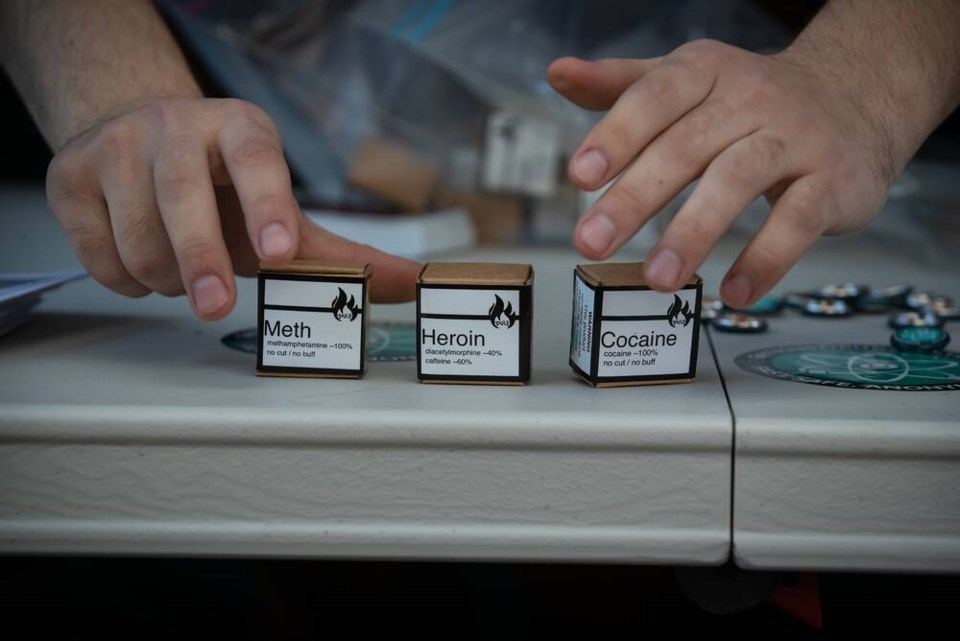The NDP government’s ludicrous position that it knew nothing about illegal drug-dealing by groups it funds in an attempt to curb overdose deaths came under increased scrutiny Wednesday.
BC United MLA Elenore Sturko supplied more details on the issue, charging that a drug-user advocacy group used the University of Victoria to test illicitly purchased drugs in order to provide safer substances to people at risk of dying from toxic overdoses.
She demanded measures to ensure researchers and public institutions in the field are working legally and ethically.
That came the same day the government instantly rejected chief coroner Lisa Lapointe’s recommendation to make hard drugs even easier to get by creating a “non-medicalized approach” to make them available on demand.
A panel of experts from various fields convened by Lapointe urged that enhancement to the safe-supply model. But Mental Health and Addictions Minister Jennifer Whiteside responded immediately with a hard no.
“Non-prescription models for the delivery of pharmaceutical alternatives are not under consideration. I cannot accept the primary recommendation of this report to pursue a non-prescriber model of safer supply.”
It looks like the government was scorched by the revelations last week about the "Drug User Liberation Front.”
The group is funded by a health authority to do drug-testing and other harm-reduction measures, but has long publicly advertised the sale of controlled drugs obtained outside the law as well. It said it funds those operations with revenue separate from the government.
After the issue blew up in the legislature, the NDP ordered the contract terminated and Vancouver police searched the facility and arrested two people.
Premier David Eby said the group was doing life-saving work, “but they were also breaking the law, which we will not tolerate.”
Public Safety Minister Mike Farnworth said: “People who engage in breaking the law can expect there to be consequences.”
Whiteside said the government expects its partners in safe supply “will act in a lawful manner.”
But the perception of taking instant action after the whistle was blown looks extremely dubious.
Sturko, a former RCMP member, said she has further information that DULF trafficked illicit drugs to 15 other community service providers, including 10 that receive public funding.
She said a medical research director at the BC Centre on Substance Use also spoke in a public forum “of his involvement with the illegal and unethical research being done at DULF.”
Sturko said there is a “gross lack of oversight” and demanded more investigations.
She specifically wants a probe into when cabinet ministers “first became aware of the ongoing criminal activity at DULF, and an explanation as to how such a lapse in oversight happened.”
None of that is going to happen. But the fallout from the initial revelation has opened a gulf between the chief coroner, backed by experts in the field, and a government that doesn’t look to have much control over the harm-reduction efforts.
Through “willful blindness or incompetence,” the government has turned a blind eye to a publicly funded trafficking network, Sturko said.
“It’s really difficult to believe that someone wouldn’t have had any clue about this.”
Government communication professionals routinely scrub the web for all information about issues. Sturko rejects the notion that any of the multiple mentions and admissions about providing illicitly bought drugs wouldn’t cross a minister’s desk.
There’s no joy in DULF losing funding, she said. But the government needs to expand services for people in ways that don’t involve criminal activity.
Lapointe’s panel stressed the urgency and said the fastest way to reduce overdose deaths is to reduce dependence on the unregulated toxic supply. That requires more access to quality-controlled regulated drugs for people at risk.
It’s currently being attempted through the medical model, but the panel said various limitations hamper the ability to meaningfully address the crisis.
Lapointe dismissed the legality concerns, saying: “If you see someone in a burning house, it is somewhat justified to smash a window.”
It’s another illustration of the increasing desperation that’s driving the failing efforts to staunch the losses.
Just So You Know: A previous column erroneously reported the escalating carbon tax will cost $1.50 a litre on gas by 2030. The scheduled hikes would raise the per-litre price of gas by 23 more cents on top of the current 14 cents. My regrets.



